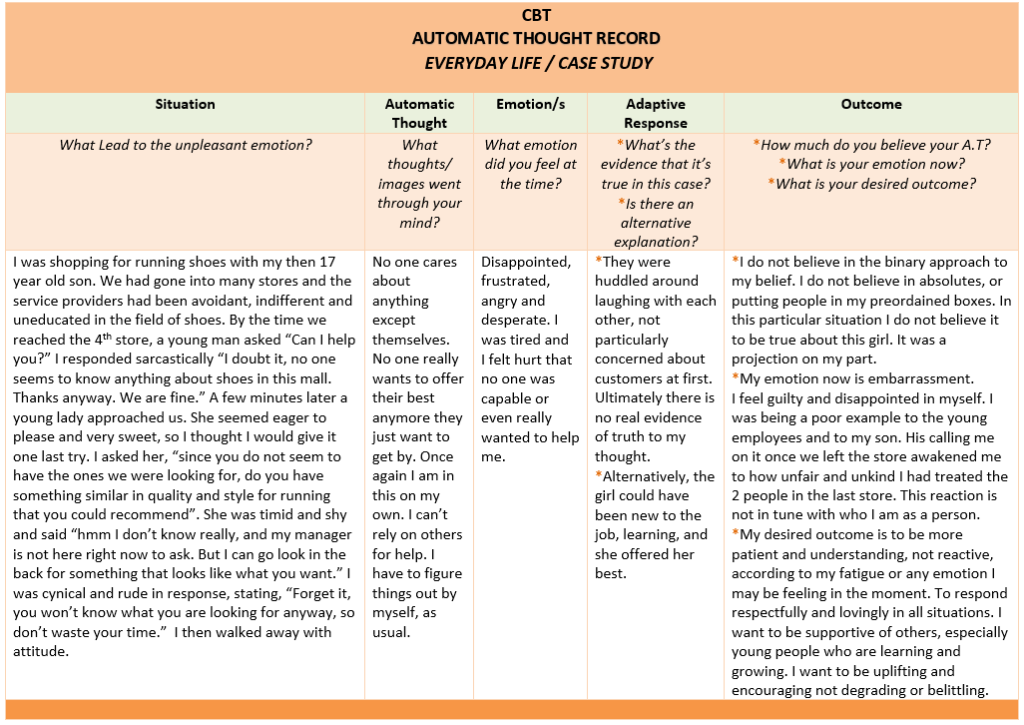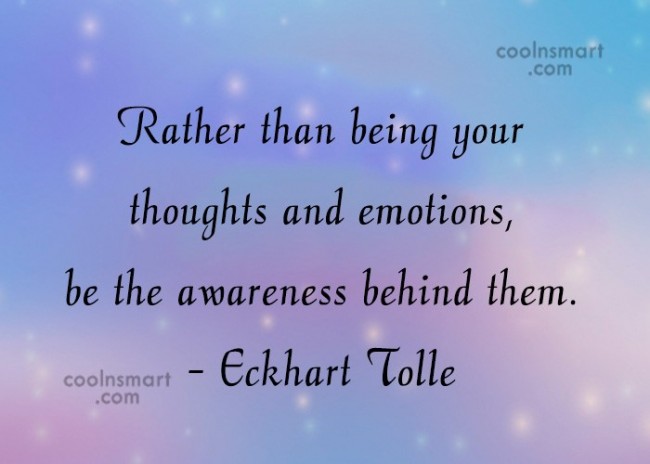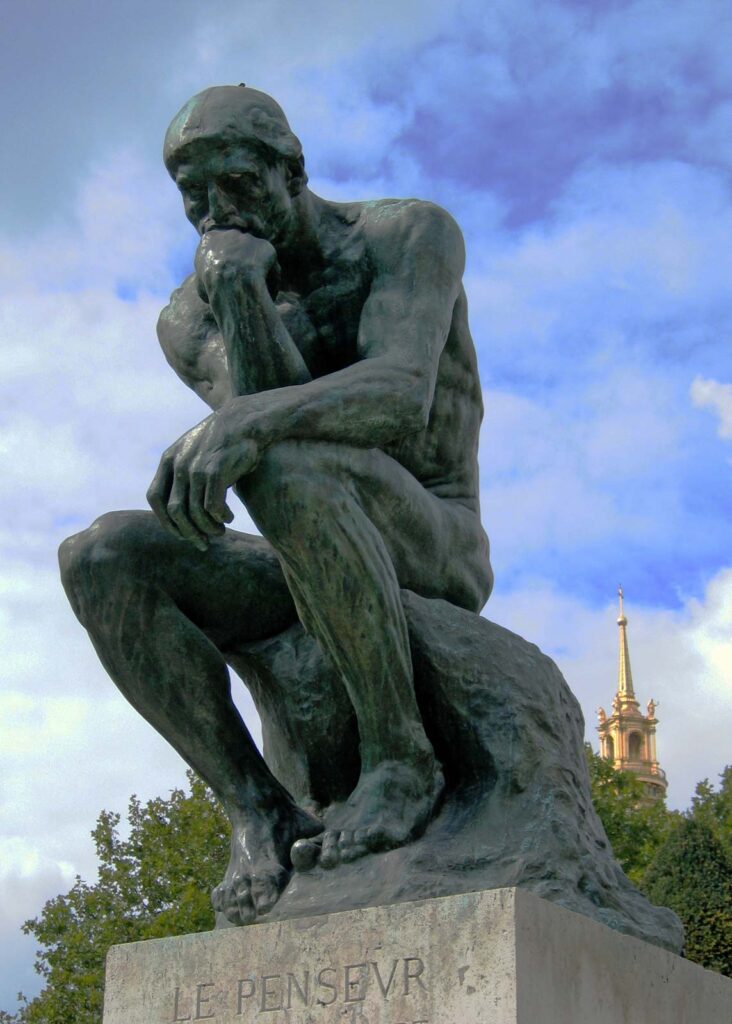USING THE CBT THOUGHT RECORD
Have you ever considered that maybe who you think you are and who others think you are not the same? Similar to your recorded voice sounding nothing like the way you hear it in your head. Does how you perceive yourself in the world match with how you present yourself to the world? Do you ever feel like you are not really being seen or that you are consistently misunderstood? Have you ever met someone whose tone of voice is loud and aggressive and when you ask what they are angry about they respond with confusion, “Angry? I am not angry. What makes you think I am angry?” Becoming aware of how we present to others is very helpful in relationships. Being our authentic self is easier when our thoughts, emotions and behavior match. Last week’s blog was on the benefits of expressing ourselves emotionally. A natural correlation to a discussion on emotions is one dealing with our thoughts. A great tool for analyzing what are helpful and unhelpful emotions and thoughts in our life is The Cognitive Behavioral Therapy (CBT) “Automatic Thought Record” (ATR). It is a great tool to help you manage unconscious emotional reactions in your life. I will be simplifying it a bit for clarity and brevity purposes. This tool is usually carried out in conjunction with psychotherapy sessions and is more in depth and has proven to be very useful for clients. The underlying message of CBT is that the way we think (our cognitions) and what we do (our behavior) affects the ways we feel. It follows that if we want to change the way we feel then we will need to make changes to the way we think and act.
Everybody has thousands of thoughts per day. Some are helpful and uplifting (e.g. “I’m glad I did that”, “I really like being here”), and some are more downbeat (e.g. “I’ll never be able to do this”, “I’m a waste of space”).
More importantly, some are accurate (e.g. “I really messed up that time”) and others are untrue (e.g. “I’m completely useless”).
Key things that you need to know about your thoughts are:
- We all have quick and automatic thoughts that just ‘pop’ into our minds
- These automatic thoughts are often based on assumptions, not facts
- Automatic thoughts are very believable, but they can be inaccurate
Thought records are an important part of cognitive behavioral treatment for many problems. They are useful because:
- They make our negative automatic thoughts visible to us
- They help us to identify any problems with our thinking
- They can help us to make changes to our thinking
*(https://www.psychologytools.com/self-help/thought-records/)
The following is a personal example that I am sharing with you for the purposes of demonstrating the effectiveness of using this model for a wide range of emotions and situations. You do not have to be a certified madcap before using this tool nor do you have to be regularly expressing undesired emotions. Maybe it’s only when you get triggered or have physical impairments, such as a lack of sleep that prompt these unfavorable emotions and thoughts. This is simply a useful tool to help you manage your emotions in a way that will allow you to live a healthy, balanced and authentic life.

Some of you may wonder why go through all these steps for such a small encounter? First of all, small incidents are often precursors to larger ones, so why not tackle small issues before they become large ones, causing more damage? Secondly, when you begin practicing this methodology in your head after each incident, the process becomes very quick and automatic. It doesn’t take long before it becomes habitual and you forget you are even doing it.
Processing your thoughts, emotions and actions using the ATR is helpful in making clear and visible what is actually going on during your interaction or situation. It helps you to look deeper into how you present yourself to others and who you present yourself as. It helps you to analyze whether how you are on the outside matches who you are on the inside. When there is a contradiction, such as with the presumed angry person in the beginning of this blog, it helps to make sense out of it, finding a harmonious balance in your life, which will be an asset in communications as well. When we live authentically, our inside and outside will match. We will feel a sense of equilibrium and contentment in our life. It is a lot easier to change the things we acknowledge and explore (work on) than that which is lying dormant in the subconscious. It is beneficial to work through these items with a therapist, as understanding the root of your automatic thoughts can help you heal underlying brokenness. It can help to more thoroughly process how you developed into who you are today and how to hold on to the helpful stories and let go of the unhelpful ones.
The particular incident that I shared in the case study happened almost 3 years ago. I state this only to illustrate that once you become aware, and begin adapting this practice into your daily routine, the incidents of your subconscious taking over your conscious thoughts becomes very rare.
Sometimes it takes a tough situation, a trial or an all-out war to get us to awaken our subconscious. Other times, such as in my case, it was having my son point out my poor behavior. It is helpful to have friends or family who are willing to lovingly confront us on our conduct. Equally, it is helpful when we are open to hear and receive constructive feedback. There are some people who choose to learn and grow the hard way and that is okay, so long as they are learning. I have a friend who had to lose everyone and everything in his life before he realized or was able to acknowledge his part in his losses. Playing a victim will not win you friends or relationships, self-righteousness won’t help you either. Feeling that you are justified and right in a particular situation is not worth losing a friendship over or losing your serenity. Or is it? That is the question you have to ask yourself. “What is important to me?” “What outcome do I want and who do I want to be in the narrative of my life?”
Just Wondering
- Who do you want to be?
- Who do others want you to be?
- Who are you really?
- Who should determine these answers?
- Who or what has been determining these answers?
- Have you ever watched a movie or read a book where one of the characters really annoyed you? You didn’t agree with their decisions or respect their actions and you thought, “If I were in that situation I would ________________.”
- You are the main character in your story and it’s up to you how you fill in that blank. What will your story be and who will you be in the story?


